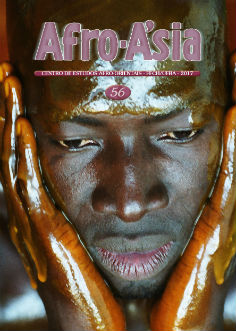Ações afirmativas para afrodescendentes no debate do parlamento uruguaio
DOI:
https://doi.org/10.9771/aa.v0i56.25871Abstract
Neste trabalho, são examinados os argumentos discutidos no Parlamento Nacional uruguaio durante o processo que chegou à sanção da Lei nº 19.122, Afrodescendentes. Normas para favorecer sua participação nas áreas educativas e trabalhistas. Essa lei é a medida de política pública mais relevante do Estado uruguaio no tocante à afrodescendência e contou com votação unânime para sua aprovação. No entanto, a análise do debate deixa entrever posições contraditórias não manifestadas e dúvidas explícitas por parte de alguns parlamentares. Em comparação com outros países que adotaram políticas afirmativas, a discussão uruguaia apresenta argumentos similares, mas em um contexto com algumas particularidades como a gratuidade e a não restrição do acesso ao ensino público e uma sociedade com mais diversidade e presença afro.
Palavras-chave: afrodescendência - Uruguai - políticas públicas - reconhecimento - redistribuição.
Abstract
This paper analyzes the arguments discussed at the Uruguyan National Parliament during the process that led to the passing of the Law 19.122. Afro-descendants. Regulations to promote participation in the areas of education and work. This law is the most relevant public policy step taken by the Uruguayan government related to Afro-descendants, and was passed unanimously. However, an analysis of the debate reveals unspoken contradictory positions and explicit doubts from some members of parliament. When compared to other countries that have adopted affirmative action policies, the Uruguayan discussion shows similar arguments. Nevertheless, the Uruguayan context has distinctive features such as free and unrestricted access to public education, and a more diverse society with greater Afro-descendant presence than perceived.
Keywords: Afro-descendant - Uruguay - public policies - recognition - redistribution.
Downloads
Downloads
Published
How to Cite
Issue
Section
License
Copyright (c) 2018 Afro-Ásia

This work is licensed under a Creative Commons Attribution 4.0 International License.
You are entitled to freely share, adapt and use the work herein published for any legitimate purpose as long as authorship and the original source are acknowledged.




